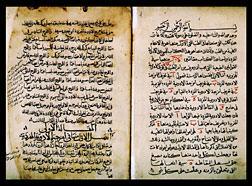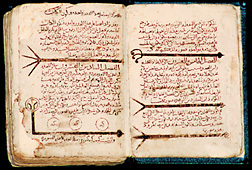|

Autumn 2005 (13.3)
Page
73
Baku's Medical Manuscripts
Registered in UNESCO's Program "Memory of the World"
by
Dr. Farid Alakbarli
In July 29, 2005, UNESCO officially
entered three of Azerbaijan's medieval medical manuscripts into
the registry of the Memory of the World Program. Dr. Koichiro
Matsuura, Director-General of UNESCO, personally presented the
certificate in Baku at the Institute of Manuscripts of the Azerbaijan
National Academy of Sciences.
Inclusion into the UNESCO list came after a long, involved process
that confirmed the authenticity of specific documents and manuscripts.
The Memory of the World Program is administered by a secretariat
based at the UNESCO Headquarters in Paris. The program's goal
is to represent the diversity of languages, peoples and cultures,
and to hold up a mirror to the world reflecting the knowledge
and wisdom of collective memory. UNESCO's mission is especially
exemplary, given the fragility of world memory, as everyday some
of these invaluable documents are lost, only to be forever erased
from the face of the earth.
UNESCO seeks to discover and protect the most important, rare
and unique written documents which are crucial and which can
never be replaced, not only for separate regions, states or nations,
but also for humankind as a whole. Now three medieval manuscripts
from Azerbaijan have been added to this prestigious list of invaluable
resources.
Avicenna Canon
One of the rarest treasures in Baku's Institute of Manuscripts
is the oldest copy of the second volume of The Canon of Medicine
(1030) by Ibn Sina, who became known in the West as Avicenna
(980-1037).
  Left: A rare copy of Avicenna's Canon (Arabic), copied
in 1143 about 100 years after the physician's death. This work
is valued as the most famous Medical Canon in medical history
in both East and West. This is one of the three Medical Manuscripts
from Baku's Institute
of Manuscripts that have been registered in UNESCO's prestigious
program, "Memory of the World". Left: A rare copy of Avicenna's Canon (Arabic), copied
in 1143 about 100 years after the physician's death. This work
is valued as the most famous Medical Canon in medical history
in both East and West. This is one of the three Medical Manuscripts
from Baku's Institute
of Manuscripts that have been registered in UNESCO's prestigious
program, "Memory of the World".
Baku's copy dates from
1143 about a hundred years after the physician's death. This
manuscript is considered to be the most reliable that exists
in the world.
Avicenna was born in the town of Afshana near Bukhara (Uzbekistan)
and later went on to do much of his medical observation in Persia
and Azerbaijan. Canon, an encyclopedic work in Arabic, is considered
to be the single, most famous treatise in medical history - both
in the East and the West.
In the 12th century, the Canon was translated from Arabic to
Latin by Gerard of Cremona (1140-1187) and used as a medical
textbook in European universities. The book was so highly revered
that Michelangelo once said: "Better to be mistaken following
Avicenna, than to be correct following others."
Kashani's Souls
Arvah al-Ajsad (Souls Of Bodies) by Shamsaddin bin Kamaladdid
Kashani is not found in any other known collection or catalogue
in the world except Baku's. The book consists of 34 chapters
(fasl) with each chapter divided into paragraphs (bab). The text
is written in the elegant Nastalik script in Persian on cream-colored
European paper edged with gold filigree.
In this volume, Kashani provides an exhaustive explanation of
all kinds of medicine and diseases - from the simplest to the
most complex. Before writing the book, Kashani carefully studied
the works of his predecessors, including ancient and medieval
physicians such as Hippocrates, Galen, Zakaria Razi, Ismayil
Gurgani and Ibn Baitar.
This unfinished manuscript does
not contain a colophon - an inscription typically placed at the
end of a book, providing facts about the publication such as
the name of the copyist and date. However, by analyzing other
details, the manuscript can be dated to the 17th century.
Zakhravi's Surgery
The Book of Surgery and Instruments by Abulkasim Zakhravi dates
to the 13th century. Zakhravi, an Arabian physician known in
medieval Europe as Abulcasis (Latinized form of Abulkasim), was
born in Andalusia (Spain) when it was ruled by Arabs.
  Left:
Zakhravi's Surgery with sketches of medical instruments dating
back to the 13th century. This is one of the three Medical Manuscripts
from Baku's Institute
of Manuscripts that have been registered in UNESCO's prestigious
program, "Memory of the World". Left:
Zakhravi's Surgery with sketches of medical instruments dating
back to the 13th century. This is one of the three Medical Manuscripts
from Baku's Institute
of Manuscripts that have been registered in UNESCO's prestigious
program, "Memory of the World".
For many centuries Zakhravi's
book was the most authoritative textbook on surgery in both the
East and the West. The manuscript provides descriptions of various
types of surgical treatments and sketches of hundreds of surgical
instruments, which were in use 700 years ago.
The Institute of Manuscripts of the Azerbaijan Academy of Sciences
in Baku has a collection of 390 early medical documents of which
363 manuscripts date from as early as the 9th century. Most of
them were written in Arabic - the literary script of the day.
Of these, 70 are in the Arabic language, 71 in Turkic languages,
and the remainder in Persian.
Dr. Farid Alakbarli serves as
Chair of the Department of Information and Translation at the
Institute of Manuscripts in Baku. His own specialty is Medieval
Medical Manuscripts in the Arabic script. Contact Dr. Farid Alakbarli
at: alakbarli_farid@yahoo.com.
Back to Index AI 13.3 (Autumn
2005)
AI Home
| Search | Magazine
Choice
| Topics
| AI Store | Contact us
Other Web sites
created by Azerbaijan International
AZgallery.org | AZERI.org | HAJIBEYOV.com
|


